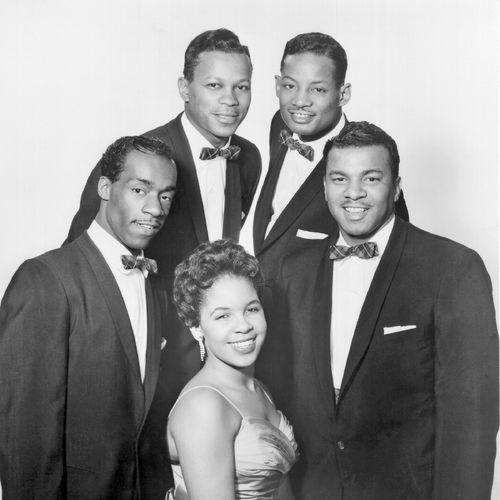
I generally try to accept the idea that music is subjective, that it’s beauty is in the ear of the beholder. What sounds good to some people may, I guess, not sound good to other people. But also I am often ready to argue that this just does not apply to some music. Some music just has an intrinsic resplendence and if you don’t hear it’s beauty then something is wrong with you. Some music, dare I say, is perfect.
Case in point, the recordings of the vocal group the Platters. In the 1950’s, the Platters recorded at least a handful of songs that I would argue are perfect. On many different levels and in many different ways, the Platters’ best recordings are prime examples of how good a pop record could be and, additionally, these songs – over 60 years later – represent the very pinnacle of the glory and the warmth of nostalgia as they are beacons that hearken back so accurately to a time many of us can’t leave behind.
Herb Reed was a singer who moved from Kansas City to Los Angeles in 1943 when he was 15. He arrived in town with just $3 in his pocket and the clothes on his back. He worked at a car wash making $20 a week before getting into the music scene. Reed, a bass singer, assembled a quartet in 1953 and gave them the name “The Platters”, inspired by the disc jockeys of the day who often referred to the records they spun as “platters”. Reed’s group toured up and down the West coast and performed in talent shows, each member keeping his day job.

In the summer of ’53, Reed’s lead singer left to join another group and was replaced by Tony Williams. Tony hailed from New Jersey and had been a sergeant in the U.S. Air Force. Tony’s sister was singer Linda Hayes who had released a couple of singles and she told her brother to come out and join her in Los Angeles. Tony did so, working as a parking-lot attendant by day while cruising the talent shows at night.
While singing at one of these shows, Tony was heard by Ralph Bass, who was in charge of Federal Records, a subsidiary of King Records. Bass recruited Williams and put him together with Herb Reed and Co. and got them into the recording studio. The first single by this early incarnation of the Platters was released to zero acclaim in the fall of ’53; a trade paper did make note of it, though, saying simply it was “good”.
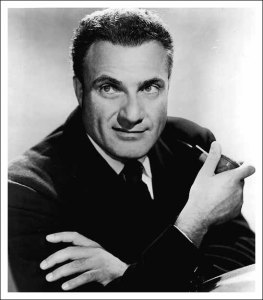
Enter Buck Ram. Samuel “Buck” Ram was a Jewish songwriter from Chicago who had co-written the evergreen “I’ll Be Home for Christmas” – although there is some debate over this. He also had written “Twilight Time”, an instrumental hit for the Three Suns in 1944. By the mid ’50’s, Ram had moved to Los Angeles and set up shop as a talent manager. One singer on his roster was Linda Hayes, Tony Williams’ sister. Ram took over the Platters from Ralph Bass and made the bold move of adding a female singer, high school student Zola Taylor, to the line-up. Ram secured a contract for the group with Mercury Records who at first planned to release the Platters’ records on a subsidiary “race” label. Ram bristled at this and demanded that the groups’ music be issued on the mainstream Mercury label so as not to restrict their music to one demographic. When the label acquiesced, a small victory was scored for racial integration; the Platters would be heard by the entirety of the record-buying public.
First up was “Only You (and You Alone)”, a song written by Buck Ram and on which he plays piano. The song was a major hit in the summer of 1955, peaking at #5 on the pop charts and enjoying a 7-week stay atop the R&B charts. This first hit of theirs is an example I can point to when I argue that some of the Platters’ music is actually perfect. “Only You (and You Alone)” has been covered many times and has been a hit for others as diverse as Franck Pourcel, Ringo Starr and Reba McEntire.
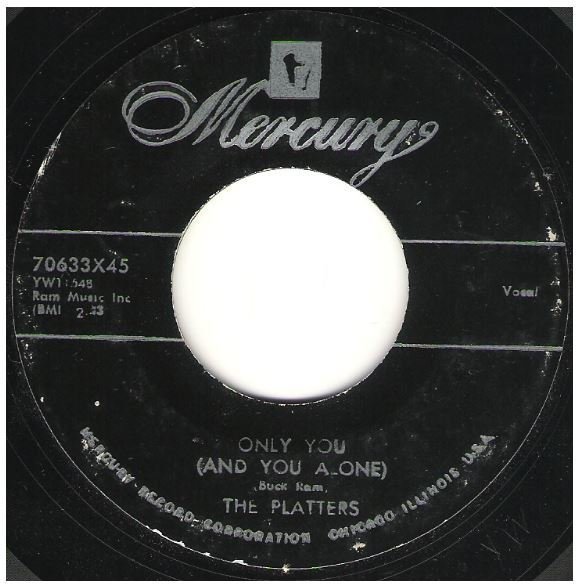
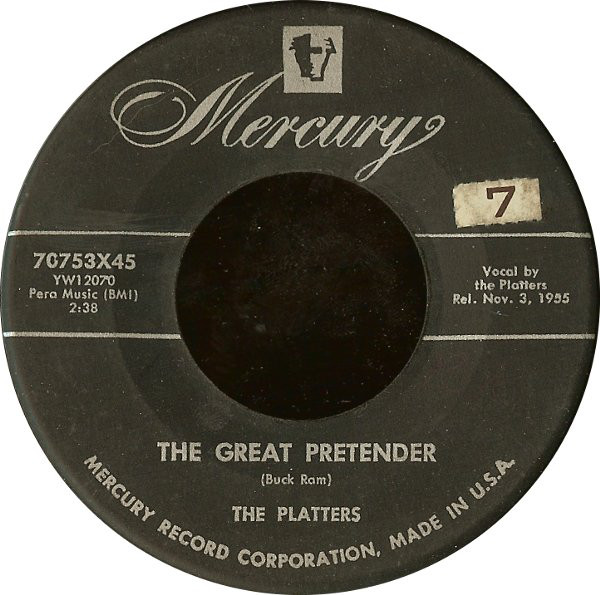
As “Only You” was riding the charts, someone approached Ram in the Flamingo Hotel in Las Vegas and asked how the Platters would follow up their huge hit. Ram went into a bathroom in the hotel and emerged 20 minutes later with “The Great Pretender”. Released on my birthday – November 3rd – in 1955, this hastily written follow-up rocketed to the top of the pop charts and was #1 on the R&B listings for 11 weeks. I have to say, these two records released in a 5-month period in 1955 are flawless performances and are iconic examples of what we all think of when we think of “oldies”. The blend of doo-wop and pop is simply gorgeous.
The Platters followed these songs in 1956 with the hits “(You’ve Got) The Magic Touch” (#4 pop, #4 R&B) and “My Prayer” (#1 on both charts) and then proceeded to issue sublime recordings like “You’ll Never Never Know” and “It Isn’t Right” that reached the Top 40. Then in 1958, the group recorded the Number One songs “Twilight Time” and “Smoke Gets in Your Eyes”, highlights of an impressive chart run; 16 Top 40 hits between 1955 and “Harbor Lights” (#8) in January of 1960. I also have to make mention of what may be my favourite Platters song. “Wish It Were Me” is Tony Williams at his best and this song – a lesser chart entry in ’59 – is heartbreaking in sentiment and performance.
Throughout their hit-making years, the Platters were highly visible, appearing in no less than five motion pictures. In a rarity for groups at the time, the Platters were incorporated with all five members receiving shares in the company. They also toured extensively throughout Europe being billed as “international ambassadors of musical goodwill”. The group’s fortunes took a hit, though, when the four men were arrested in Cincinnati on a “morals charge”; the boys had four girls in their hotel room with them and three of the girls were white. The case – with racial overtones – was dismissed but some damage had been done.
The thing I think that has to be pointed out is the magnificent voice of Tony Williams. Not enough is said about this man’s sumptuous tones and it could be argued that he was possessed of the finest voice in the pop/rock ‘n’ roll world in the 1950’s. The story goes that Williams was once overheard by those in a neighbouring studio singing opera. When the curious saw who was singing they were astonished; “Oh, man, it’s a brother singing opera!”. Perhaps the finest example of his singing can be heard in the group’s cover of the Ink Spots’ “My Prayer”. The final note Tony hits is particularly stunning. Williams himself revealed a little of the effect a note like that could have on him to an interviewer; “It was a little rough because it kind of saturates your brain. When you hit a note like that you get a little dizzy, like you’ve had a drink or something”

Williams was a stylish man who sang with controlled passion. In 1960, he left the group to strike out on his own but was unsuccessful as a solo act. This is a shame because, in the right setting, Tony Williams had few peers when it came to finessing a lyric. He toured for many years with a Platters tribute act and was inducted with the group into the Rock ‘n’ Roll Hall of Fame in 1990. He died two years later after suffering from diabetes and heart disease. He was 64.
Founding member Herb Reed had christened the group and proved to be their longest-serving member, the only member to sing on all of their 400+ songs. Unfortunately, though, the same fate befell the Platters that had inflicted their inspiration, the Ink Spots, who they frequently covered. Starting with Sonny Turner replacing Tony Williams in 1960, the group’s line-up went through scores of changes over the years. Also, many of the members took their own version of the group on the road and court battles were rampant over who had the legal right to use the name. In the end, I count 47 different members of 8 different incarnations of “The Platters”. Although, I have read that the number of performers who have appeared in Platters tributes is more in the “hundreds”.
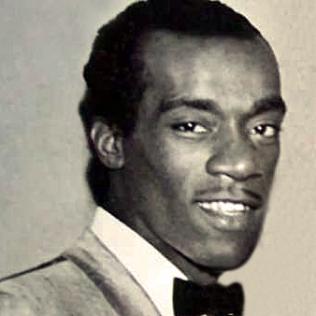
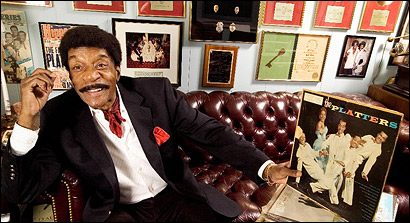
In a fitting piece of justice, it was Herb Reed who was eventually granted legal rights to the name “The Platters” after a lengthy court battle. Amazingly, Reed was still performing live in 2012 when he eventually passed away in Boston, aged 83. Seems proper that Reed’s son and three grandsons will likely benefit from Herb’s long career bringing beautiful music and memories to the masses.
The story of the Platters is tough to tell due to wildly differing accounts offered by many different participants in the tale. (The best place on the web for the whole story is a site ran by a guy that calls himself “Unca Marvy”) What is easy to tell, though, is that the Platters set themselves apart from and above every other vocal group of the era. Their songs presented dramatic, classic themes that made them an “adult” act while their joyous, accessible sound garnered them legions of young fans, as well. They never fell prey to white acts covering their music and stealing some of their thunder. They were the first black group to have a #1 pop record. They were the first rock ‘n’ roll group to have a Top Ten album in the US. “Twilight Time” was the first rock ‘n’ roll record to feature strings. The Platters were the first black group to appear in the Soviet Bloc when they played Poland in 1959. Significantly, they were the only group to be represented by three songs on the soundtrack to George Lucas’ American Graffiti, the 1973 film that introduced this music to a new generation. Their success, their visibility and their fine presentation helped to break down racial barriers as the group was embraced by all the listening public.
One part rock ‘n’ roll, one part doo-wop, one part R&B and one part clean pop vocal, the Platters exuded style and class. In their day, only Elvis Presley sold more records. Their songs were embraced by black and white, young and old. Additionally, all these years later, the sound of the Platters flawlessly conjures up the past. To hear them now is to sense the calm of joyful reminiscence. They sound so much like their era that their records instantly return you to that simpler time. All of these attributes combine to make listening to the Platters a perfect experience, one of the few perfect listening experiences pop music has to offer.
Great post. Love them so much.
Thanks, Maddy. Yes, they are divine.
It is at Christmas that I listen to The Platters and wonder why I don’t do that more often. Then the records and CDs come off the shelf for ease of spinning.
Thanks for enlightening me on the group that I always take for granted.
You’re welcome! While I enjoy their Christmas music, they recorded that record AFTER my man, Tony Williams, left the group. This, I know, is not a big deal to most people and “Please Come Home for Christmas” is certainly delightful.